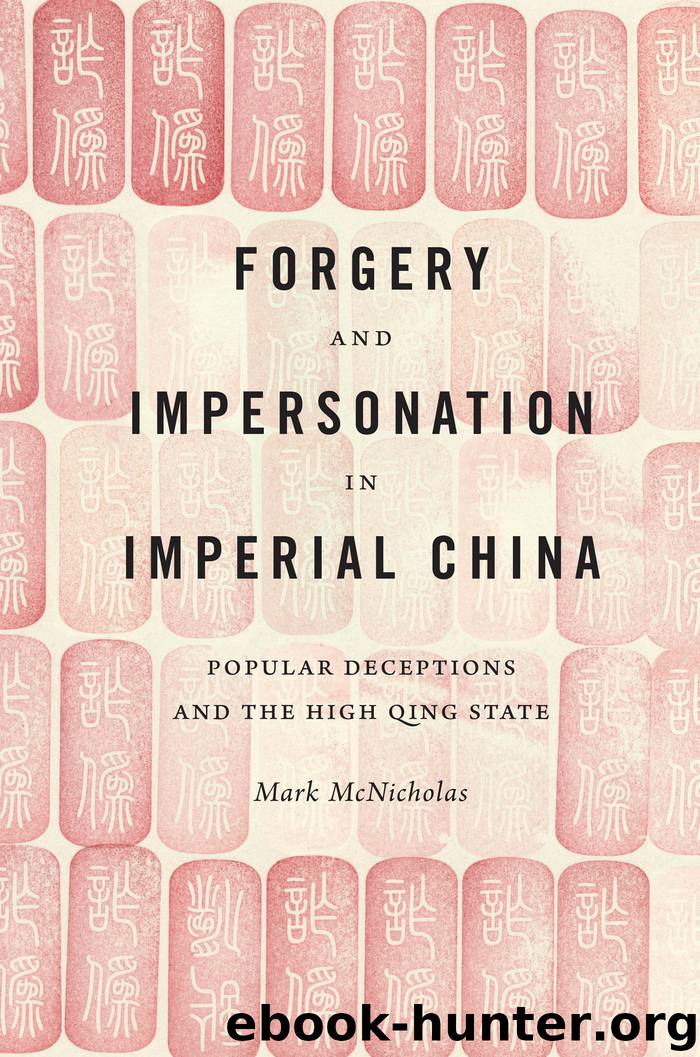Forgery and Impersonation in Imperial China by Mark McNicholas

Author:Mark McNicholas
Language: eng
Format: epub
Publisher: University of Washington Press
Published: 2016-12-10T16:00:00+00:00
SCAMMING THE SYSTEM
As the contributions system collected huge amounts of silver, it comes as no surprise that it was subject to various forms of abuse. In the realm of corruption, the Gansu grain contribution program of 1774–81 turned into a massive fraud orchestrated by the provincial administration commissioner and scores of colluding local magistrates, who together pocketed the better part of 10 million ounces of silver earmarked for famine relief.13 There was also malfeasance in lower echelons of the metropolitan bureaucracy: in 1830, clerks in the Contributions Office itself were found to be the center of a phony license scam going back fifteen years. During that time they had used forged seals to issue more than four thousand fake licenses, pocketing the funds contributed by the unsuspecting would-be licensees.14 In the area of nominal ritual titles, early in the Yongzheng period the superintendent of the Translators Institute15 described his efforts to stamp out an illicit practice that had become common there over the years: exceeding the quota of apprentice translators (yizi sheng) with purely nominal appointments, giving the shadow appointees licenses and notifying their home jurisdictions of their promotions in status. Many such appointees used the licenses as “protective amulets” (hufu) in their home towns. The report also noted that imperial edicts had already abolished similar titles at other government agencies, including astronomy apprentice (tianwen sheng), “Confucian gentleman” (Rushi), musician (yuesheng), and dance performer (wusheng).16
There was also the problem of engrossment, in which officials or other influential persons monopolized the processing of contribution funds. Xu Daling cited the example of one Huang Chunyou, who ensconced himself as proxy and monopolized the horse contributions (juanma shili) launched during the expeditions against the Zunghar khan Galdan in 1696–97. Huang’s methods included conniving with Board officials to falsify accounts, charging exorbitant rates, and the precedent-setting use of commercial establishments to collect contributors’ funds. He managed to extract some 200,000 ounces of silver in profit.17 Even without a full monopoly, proxy remittance occasionally led to the swallowing of large numbers of contributions altogether. Wu Yue has noted two such cases from the Qianlong era. In 1754 a group of criminals opened a phony banking house (yinhao) in Beijing and, under the pretext of serving as proxy contribution agents, bilked would-be contributors of 15,000 ounces of silver. Twenty years later, again in Beijing, it was reported that the operators of another “bandit bank” (jianfei yinhao) had absconded with the funds entrusted to them by some 8,000 contributors.18
Download
This site does not store any files on its server. We only index and link to content provided by other sites. Please contact the content providers to delete copyright contents if any and email us, we'll remove relevant links or contents immediately.
2010-The City & the City by China Miéville(1993)
Anatomy of Injustice by Raymond Bonner(1670)
That Every Man Be Armed by Stephen P. Halbrook(1583)
ADHD on Trial by Michael Gordon(1579)
Injustices by Ian Millhiser(1502)
You Don't Own Me by Orly Lobel(1449)
Tell by Major Margaret Witt(1446)
Course Correction by Ginny Gilder(1413)
Broken Scales by Joel Cohen(1354)
Without Copyrights by Spoo Robert(1352)
A Vast Conspiracy by Jeffrey Toobin(1333)
First by Evan Thomas(1291)
J by Howard Jacobson(1263)
A Religious Orgy in Tennessee by H.L. Mencken(1257)
The Run of His Life: The People v. O. J. Simpson by Jeffrey Toobin(1216)
A Triumph of Genius: Edwin Land, Polaroid, and the Kodak Patent War by Ronald K. Fierstein(1206)
A History Of Thailand by Baker Chris(1198)
John Wayne Gacy by Judge Sam Amirante(1115)
Law 101: Everything You Need to Know About American Law, Fourth Edition by Jay Feinman(1105)
